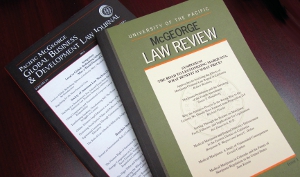Walking on two legs in Chinese law schools: A Chinese / U.S. Program in Experiential Legal Education
Document Type
Article
Publication Date
Summer 2011
Abstract
Dong Jingbo, a young faculty member at the China University of Political Science and Law in Beijing, used to teach using only the traditional lecture technique which she had experienced in her own legal education in China and Korea. Until, that is, Professor Dong attended summer workshops given by Pacific McGeorge, in partnership with American University’s Washington College of Law, and also earned an LL.M. at Pacific McGeorge, in the Teaching of Advocacy. Her classes no longer are limited to lecture. She has developed a simulation to use in Chinese criminal law classes, has demonstrated it to other Chinese law professors and has written a law review article about it.2 The simulation is based on a news story about a man who used his wife’s ATM card to make two successive withdrawals of 10,000 RMB, while the receipts reflected a total withdrawal of only 2 RMB, and even though his wife had only 10,000 RMB in her account. The man was charged with theft. Professor Dong assigns students to play the role of the prosecutor, defense counsel and judge. They are given the definition of theft, and must argue and decide the case. She then provides a series of additional facts, requiring deeper analysis. Introduction of this role play into the class builds on learning theory to provide deeper understanding of the elements of the crime of theft than a student could obtain by listening to a lecture. Moreover, this learning by doing encourages analysis, fact development, understanding of the important role of the theory of the case, and independent thinking. For these reasons, and as our experience in China affirms, role play is a useful learning method in traditional, simulation, and clinical law courses.
Publication Title
International Journal of Clinical Legal Education
Volume
38
DOI
10.19164/ijcle.v15i0.55
Recommended Citation
Brian K. Landsberg,
Walking on two legs in Chinese law schools: A Chinese / U.S. Program in Experiential Legal Education,
38
International Journal of Clinical Legal Education
(2011).
Available at:
https://scholarlycommons.pacific.edu/facultyarticles/509




